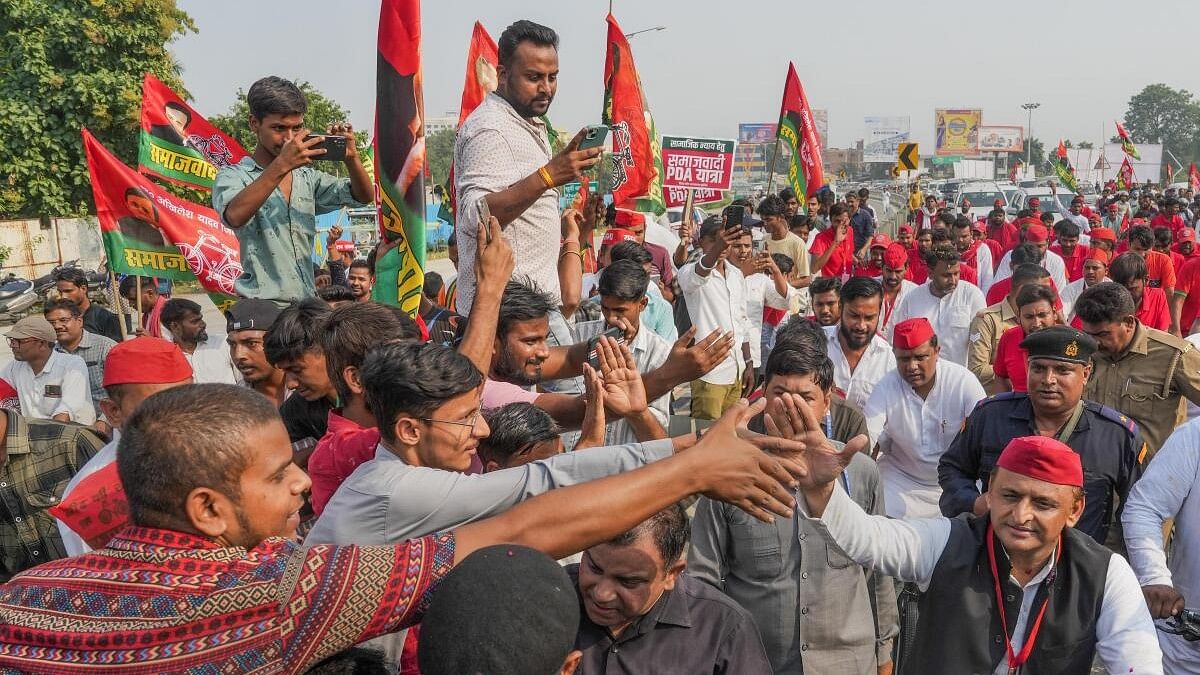
Akhilesh Yadav at the SP PDA ((pichda, dalit, alpsankhyak) Yatra
Credit: PTI Photo
Lucknow: Realising that the OBCs, which form around 40 to 45 per cent of the total electorate in Uttar Pradesh, may well decide the winners in the state in the forthcoming Lok Sabha polls, all the major players - BJP, Samajwadi Party (SP), and the BSP- have been scrambling for their votes.
While the BJP has, apparently eyeing the OBC votes, allied with the Apna Dal (Anupriya Patel), Suheldev Bhartiya Samaj Party (SBSP) and Nishad Party, the SP is banking on its 'PDA' (pichda, dalit, alpsankhyak) formula to garner the support of the OBCs. The SP recently undertook a 'PDA yatra' across the state and organised meetings of the OBC communities in different parts of the state.
The SP was also buoyed by its victory in last year's by-poll in the Ghosi assembly seat when its nominee defeated the OBC candidate of the BJP and wrested the seat.
BSP supremo Mayawati too has, unlike in the past, fielded a comparatively large number of OBC candidates in the hope of weaving a 'dalit-Muslim-OBC' combination to deliver in the polls.
The OBCs are mainly divided into two broad categories in UP with communities such as 'Prajapati, Saini, Kushwaha, Maurya, Shakya, Rajbhar, Manjhi, Turaha' being classified as 'extremely backward' (EBC) while 'Yadav, Kurmi' being in the backward category. While the 'Yadavs and kurmis' are in sizeable strength, mainly in the eastern UP districts, the EBCs are spread from the east to the western region.
While the Yadavs have by and large supported the SP, the BJP managed to garner the support of a major chunk of the Non-Yadav OBCs by allying with caste based outfits which yielded rich electoral dividends.
The opposition parties have, in an apparent bid to win the support of the OBCs, made caste census a plank in these elections and the SP and Congress, which are contesting the polls in alliance this time, have promised to conduct a caste census if they come to power.
A peep into the past assembly polls in the state reveals that the party, which received the support of the OBCs, formed the government in the state. In 2007, the BSP had formed a caste-wise 'Bhaichara Committee' and managed to get the support of a substantial chunk of EBC voters and formed a government in the state.
The OBCs extended support to the SP in 2012 and as a result the latter formed a government in the state in 2012. Later on, however, SP was accused of giving preference only to the Yadavs and it provided a chance to the BJP to wean them away from the SP in the 2014 Lok Sabha and 2017 assembly polls in the state and again in the 2022 assembly elections.
That the BJP realises the significance of the OBCs in the state can be gauged from the fact Prime Minister Narendra Modi seldom forgets to mention in his election meetings that he hails from the OBC.
''Who wins the UP battle will depend largely on who is able to win over the majority of the OBC voters....BJP will leave no stone unturned to ensure that its non-Yadav OBC vote bank is not dented while its rivals will go all out to get their support,'' said veteran Lucknow-based political analyst J P Shukla.
It remains to be seen which party succeeds in getting the OBC support this time.